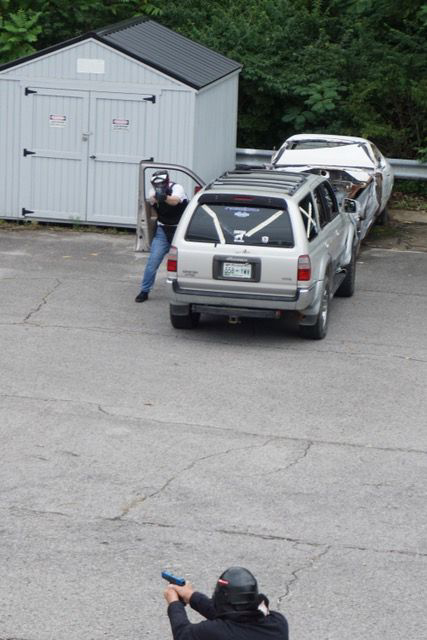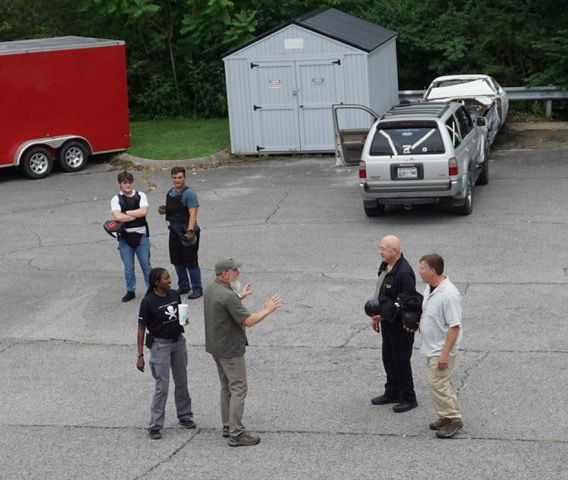It’s often said that if you take away a single good point from training, the training was successful. When I train, my goal is to learn best practices, identify my faults relative to those best practices, then come up with workable remedies.
If that’s true, I’m two-thirds of the way to successful after last weekend three-day Gunsite course in Nashville. This week, I’ve been reviewing errors revealed during the class- especially those errors that resulted in being shot at during force-on-force drills.
My shooting flaws I can correct with dry fire and range time.
The mental errors are turning out to be far tougher to address.
Since an incident in the early 1980s, I’ve operated with a single mindset: when attacked I had to immediately respond to the threat - with decisive action.
The immediate response idea is correct. But I know now I’ve been considering the wrong decisive actions in many circumstances.
Force-on-force scenarios last weekend brought home the realization I was making bad decisions - and taking decisive actions with no-win outcomes. Even if I won, I lost.
In one scenario, I was sitting in a restaurant with friends when a commotion broke out -with gunfire- in the restrooms.
I drew my pistol, moved my friends out of the line of fire and took a defensive position.
When a person backed out of the restroom with a gun, I called for them to drop their weapon. They refused and glanced in my direction. I fired, putting a good hit in a probably fatal area in their side. They fell backward into a room across the hall. I talked to the shooter, encouraging them to “put their gun down and show me their hands” knowing I’d hit them with my round, I said “let me help you.”
When I got to the room where they’d retreated, I “sliced the pie” to prevent exposing myself unnecessarily to the room where the “shooter” had fallen. That’s when I glanced over my shoulder and turned toward the real shooter that then put a pair of hits into me as I shot them.
That’s when the instructor ended the exercise.
That might read like a scene from an action movie. In real life, it was setting the stage for my upcoming trip to the jail-or the morgue.
I’d done everything wrong.
The smart -and prudent -thing when the disturbance broke out would have been to gather my friends and exit via the door right next to our table. Instead, I’d put myself into a deadly situation -unnecessarily.
Remember…I’m not a policeman -or an action hero.
And I’m absolutely not bulletproof - two sim rounds in the fingers quickly convinced me of that.
To make it worse, I was so focused on watching the person with the gun I ignored what they were saying. I heard nothing.
They were shouting: “Someone call 911 -a guy in the bathroom pulled a gun and tried to rob me. He shot at me and I think I hit him…someone call 911…please!”
Instead of the help he needed -and I could have delivered with no danger to myself, I gave him an undeserved bullet. That turned me from an uninvolved party -to a potential criminal who compounded his error by then getting himself shot.
Dumb and dumber.
I’ve spent time in shoot houses. This wasn’t my first experience with force-on-force scenario training. But I’ve never run into scenarios that involved not drawing a gun.
Several of the scenarios emphasized using the brain more than the application of lead. They emphasized creation of distance from threats more than meeting threats with gunfire.


One involved driving my car away from the crazy person pounding on the hood while screaming “Britany Spears!”
My ill-fated dining experience would have been solved if we’d simply left.
A third had me call 911 to tell the police I had an intruder in my garage. I also informed them that I was armed, in my living room with a light on -and wouldn’t move unless the people ransacking the garage kept coming toward me. I also left the phone line open so 911 could record what happened before the police arrived.
Even in a scenario, I didn’t like the idea of listening as my things were being tossed around inside my “home.”
This simple question convinced me I was wrong: “what do you have in your home other than your loved ones worth killing someone -or getting killed over?”
The answer? Nothing. A sobering realization -and change in perspective.
Retreating isn’t cowardly. “Taking action” isn’t always smart. We often don’t train to avoid conflict any more than we carry lifesaving equipment to deal with the aftermath of shooting.
We’re supposed to be training for a last-alternative response, not training to be gunfighters.
Retreating - intelligently and strategically- has far less downside than shooting an innocent person . Getting myself shot in the process just made a bad situation worse.
The primary takeaway from last weekend wasn’t the correction I need to make in my grip, although I’m working on that.
The big takeaway was that the reminder that having a gun carries the responsibility not to use it unless there is absolutely no other option.
Not every situation - even while you’re training to be more effective with it - means using the gun.
A lesson to learn before experiencing it in real life.
We’ll keep you posted.
— Jim Shepherd
